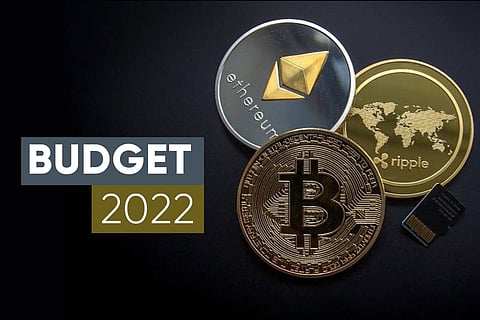

After a long period of back and forth over the ambiguity of regulation around cryptocurrency and other virtual digital asset transactions in the country, Finance Minister Nirmala Sitharaman said during the Union Budget that a 30% tax on income from such assets has been proposed. Also, to bring such assets under the tax net, she proposed a 1% TDS (tax deducted at source) on transactions in such asset classes above a certain threshold. Gifts in crypto and digital assets will also be taxed at the hands of the receiver, she said. The tax proposals will come into effect from April 1 after the passage of the Union Budget in Parliament.
The Finance Minister said there has been a phenomenal increase in transactions in virtual digital assets. “The magnitude and frequency of these transactions have made it imperative to provide for a specific tax regime,” she said. “No deduction in respect of any expenditure or allowance shall be allowed while computing such income except cost of acquisition. Further, loss from transfer of virtual digital assets cannot be set off against any other income,” she said in her statement. .
A virtual digital asset has been defined as: “any information or code or number or token (not being Indian currency or foreign currency), generated through cryptographic means or otherwise, by whatever name called, providing a digital representation of value exchanged with or without consideration, with the promise or representation of having inherent value, or functions as a store of value or a unit of account including its use in any financial transaction or investment, but not limited to investment scheme; and can be transferred, stored or traded electronically.” NFTs and any other token of similar nature are included in the definition, it added.
Experts said the 30% tax levied on income arising from the sale of cryptocurrency is similar to the tax rate on winnings from lottery, game shows, puzzles etc. Digital currency and assets like NFTs (non-fungible tokens) have gained traction globally over the last couple of years. Trading in these assets has increased manifold with cryptocurrency exchanges being launched. However, India did not have a clear policy on either regulating or taxing such asset classes. NFTs are unique digital assets with verified ownership rights and the details are stored on a blockchain.
Nangia Andersen India Chairman Rakesh Nangia said the government has walked the talk on a stable and predictable tax regime and transfer of virtual digital assets have been brought under the taxation ambit.
Ritesh Kumar, a partner at IndusLaw, said that including a specific tax regime for virtual digital assets, while it provides clarity, is not in line with what the industry was expecting. “The 30% rate of tax and restriction to set-off losses is a very bold move in discouraging transactions in crypto,” he said.
WazirX founder and CEO Nischal Shetty said India is on the path to legitimising the crypto sector in India, and is recognising crypto as an emerging asset class. “This will add the much needed recognition to the crypto ecosystem of India. We also hope this development removes any ambiguity for banks, and they can provide financial services to the crypto industry,” he said. Similarly, CoinDCX co-founder and CEO Sumit Gupta called this a step in the right direction.
Vikram Subburaj, CEO of Giottus Crypto Exchange said the announcements gives relief to investors that the government is recognising the crypto asset ecosystem and is giving clarity. “A standardised 30% tax treatment is welcome though we await the details on what is a taxable event and what is the threshold for 1% TDS deduction. We do hope that the government will give exchanges and other businesses a certain time period to enable the tech behind TDS deduction and bookkeeping. Offsetting and carrying forward losses have worked well in other countries but we are happy to see a consideration given to all such instances,” he said.
ZebPay CEO Avinash Shekhar added that tax has always been applicable to gains made on virtual digital currencies, but there was no clarity. “30% tax on income from virtual digital assets, while high, is a positive step as it legitimises crypto and hints at an optimistic sentiment towards further acceptance of crypto and NFTs across stakeholders in the country. The government has come a long way in its stance towards crypto from last February to today…,” he said.
With PTI inputs